Daily Vocabulary Words: List of Daily Used Words in Leading Indian Newspapers
Hi there. Welcome to this special section @ Wordpandit. Our endeavour here is straightforward: highlighting daily vocabulary words that you would come across in leading newspapers in the country. We have included the following newspapers in our selection:
• The Times of India
• The Economic Times
• Hindustan Times
• Mint
• Indian Express
We are putting in extensive work to develop your vocabulary. All you have to do is be regular with this section and check out this post daily. This is your repository of commonly used words; essentially, we are posting a list of daily used words. Hence, this has significant practical application as it teaches you words that are commonly used in leading publications mentioned above.
Visit the website daily to learn words from leading Indian newspapers.
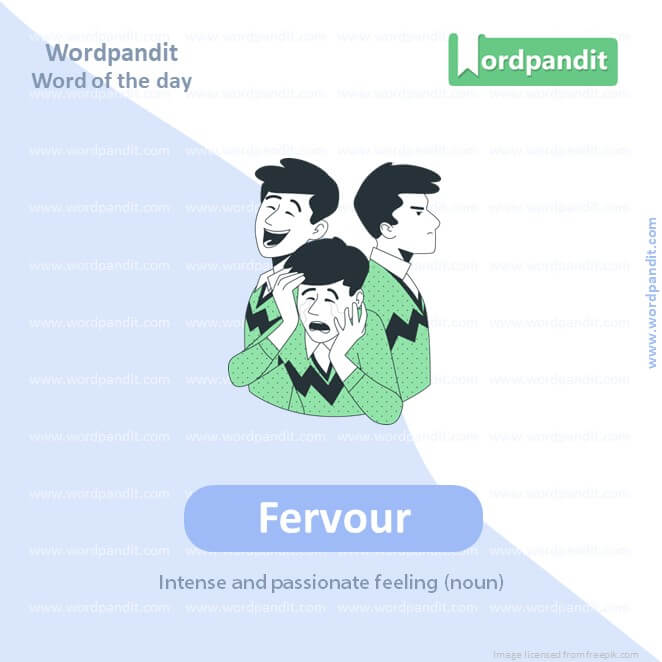
WORD-1: Fervour
CONTEXT: But that fervour seems to have been missing for Bitcoin in particular and crypto in general during 2023.
SOURCE: Live Mint
EXPLANATORY PARAGRAPH: Fervour is like having really strong feelings or excitement about something. Imagine how you feel when you’re super excited about your birthday – that’s fervour!
MEANING: Intense and passionate feeling (noun).
PRONUNCIATION: fur-vur
SYNONYMS: Passion, enthusiasm, zeal, ardor, intensity.
USAGE EXAMPLES:
1. She spoke with fervour about her plans for the future.
2. His fervour for the sport was evident in his dedication.
3. The crowd’s fervour grew as the concert began.
4. They shared a fervour for environmental conservation.
WORD-2: Derivatives
CONTEXT: Third, typically when retail investors invest in an asset class once it has rallied substantially, the fear of missing out (FOMO) dynamic is at work. In the Indian case, the FOMO trade has moved to small-cap stocks and financial derivatives this time round.
SOURCE: Live Mint
EXPLANATORY PARAGRAPH: Derivatives are things that are made or come from something else. Like how chocolate milk is a derivative of milk because it’s made from milk with chocolate added.
MEANING: Something that is based on another source or original (noun).
PRONUNCIATION: duh-riv-uh-tivs
SYNONYMS: Offshoot, spin-off, by-product, extension, variation.
USAGE EXAMPLES:
1. Vanilla extract is a derivative of vanilla beans.
2. Many new medicines are derivatives of naturally occurring compounds.
3. The new language was a derivative of Latin.
4. The artist’s work was a derivative of traditional styles.
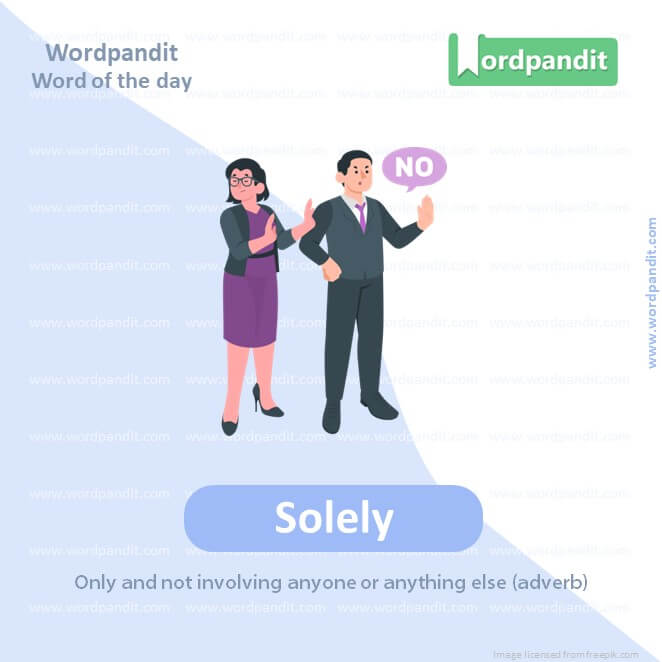
WORD-3: Solely
CONTEXT: Fifth, despite all the talk around the use cases of crypto, nothing substantial came out of it, and it turned out to be “an asset whose value derives solely from greater fools” pricing it “as high as the last idiot willing to buy it.” Of course, some greater fools continue to be around.
SOURCE: Live Mint
EXPLANATORY PARAGRAPH: Solely means only or just one thing. Like if you have a box of crayons and you use solely the red one, it means you are using only that red crayon and no others.
MEANING: Only and not involving anyone or anything else (adverb).
PRONUNCIATION: sohl-lee
SYNONYMS: Exclusively, entirely, just, purely, simply.
USAGE EXAMPLES:
1. The decision was made solely by the committee.
2. She was solely responsible for the project’s success.
3. The charity relies solely on donations.
4. The room was decorated solely in shades of blue.
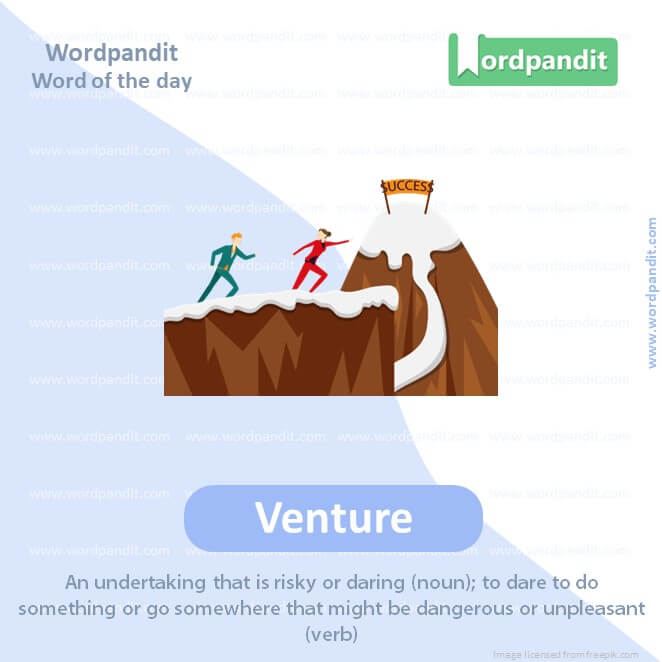
WORD-4: Venture
CONTEXT: So, there is no real communication happening from the industry to egg on another round of greater fools, possibly because venture capitalist money that funded the industry might be running out or the industry might be playing it safe, given the government crackdown on its unregulated nature, including in China and India.
SOURCE: Live Mint
EXPLANATORY PARAGRAPH: Venture is when you try something new or a little risky, like when you’re brave enough to try a big slide at the park for the first time.
MEANING: An undertaking that is risky or daring (noun); to dare to do something or go somewhere that might be dangerous or unpleasant (verb).
PRONUNCIATION: ven-cher
SYNONYMS: (Noun) Endeavor, enterprise, project, undertaking. (Verb) Dare, risk, attempt, journey, explore.
USAGE EXAMPLES:
1. They started a new business venture together.
2. He decided to venture into the unknown territory.
3. The venture required a significant investment.
4. She ventured that the plan might not work.
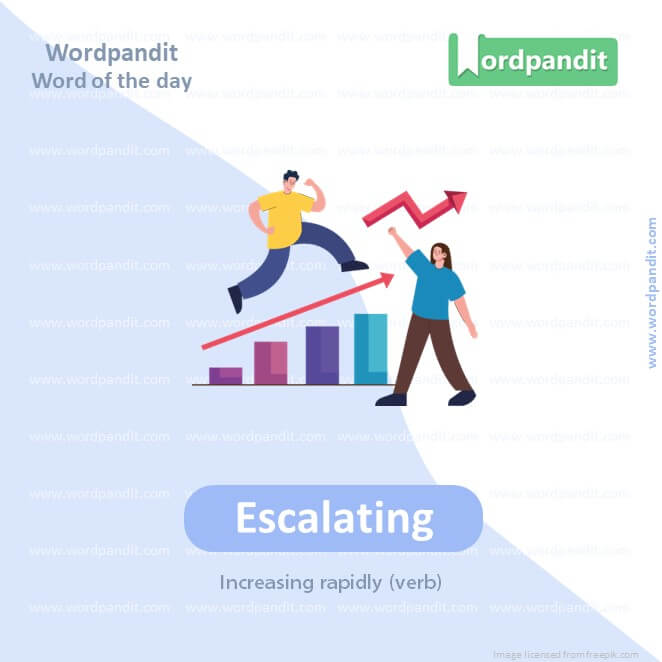
WORD-5: Escalating
CONTEXT: The rapidly escalating debt crisis in the Global South, while not a direct focus of the conference, cast a shadow over it.
SOURCE: Live Mint
EXPLANATORY PARAGRAPH: Escalating is like when something is climbing up or getting bigger and bigger, like how a hill gets steeper or a story gets more and more exciting.
MEANING: Increasing rapidly (verb).
PRONUNCIATION: es-kuh-lay-ting
SYNONYMS: Increasing, intensifying, rising, surging, growing.
USAGE EXAMPLES:
1. The conflict was escalating into a full-blown war.
2. Prices have been escalating due to high demand.
3. The situation escalated quickly, causing panic.
4. They were concerned about the escalating costs.
WORD-6: Unipolar
CONTEXT: Others focused on the changing nature of globalization, the shift from a unipolar to a multipolar economic order, and the erosion of democratic institutions amid the rise of populist nationalism.
SOURCE: Live Mint
EXPLANATORY PARAGRAPH: Unipolar is like having only one side or one way. Imagine a magnet with just one end sticking to metal things, instead of two ends. That’s like being unipolar.
MEANING: Having a single pole or extremity (adjective); in terms of mood disorders, characterized by one extreme, such as depression, without mania (adjective).
PRONUNCIATION: yoo-nee-poh-lur
SYNONYMS: Single-axis, one-sided, non-varied, focused, concentrated.
USAGE EXAMPLES:
1. The unipolar magnet only has one magnetic pole.
2. The global power structure was unipolar after the war.
3. She was diagnosed with unipolar depression.
4. The debate considered the effects of unipolar world politics.
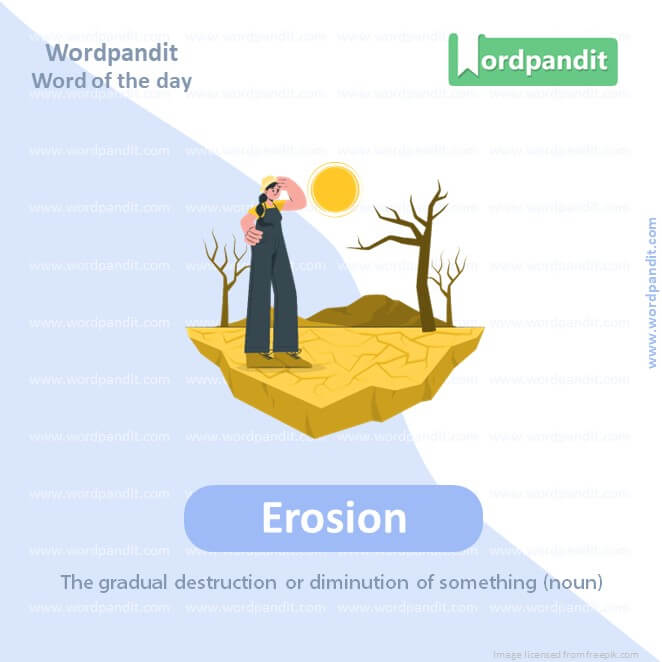
WORD-7: Erosion
CONTEXT: Others focused on the changing nature of globalization, the shift from a unipolar to a multipolar economic order, and the erosion of democratic institutions amid the rise of populist nationalism.
SOURCE: Live Mint
EXPLANATORY PARAGRAPH: Erosion is like when soil, rocks, or sand are slowly worn away or washed away by water or wind. It’s like when you see a beach getting smaller because the water is taking the sand away.
MEANING: The gradual destruction or diminution of something (noun).
PRONUNCIATION: ih-roh-zhun
SYNONYMS: Wearing away, corrosion, deterioration, degradation, attrition.
USAGE EXAMPLES:
1. The river caused erosion along its banks.
2. Soil erosion can be a big problem for farmers.
3. The erosion of the coastline is a concern for the town.
4. Erosion of trust can damage relationships.
WORD-8: Exacerbate
CONTEXT: Disillusioned Western voters’ tendency to favour right-wing leaders is puzzling, however, given that these politicians’ favoured policies will likely exacerbate the problems they purport to address.
SOURCE: Live Mint
EXPLANATORY PARAGRAPH: Exacerbate means to make something worse, like when you have a small cut and you keep scratching it, making it more sore and painful.
MEANING: To make a bad situation, problem, or negative feeling worse (verb).
PRONUNCIATION: ig-zas-ur-bayt
SYNONYMS: Worsen, aggravate, intensify, heighten, inflame.
USAGE EXAMPLES:
1. The delay only exacerbated our frustration.
2. Loud noise can exacerbate the severity of a headache.
3. His response exacerbated the conflict between the two groups.
4. Ignoring the problem will only exacerbate it.
WORD-9: Granular
CONTEXT: A more granular analysis yields a bleaker picture of the world’s economic landscape.
SOURCE: Live Mint
EXPLANATORY PARAGRAPH: Granular is like something made of tiny grains or little pieces. Think of sugar or sand; they are made of lots of tiny pieces you can see. That’s granular.
MEANING: Composed of small grains or particles (adjective); detailed and involving small elements (adjective).
PRONUNCIATION: gran-yuh-lur
SYNONYMS: Grainy, gritty, coarse, particulate, detailed.
USAGE EXAMPLES:
1. The photograph was too granular to identify the face.
2. They performed a granular analysis of the data.
3. The granular texture of the sand felt rough.
4. His approach to the problem was very granular.
WORD-10: Bleaker
CONTEXT: A more granular analysis yields a bleaker picture of the world’s economic landscape.
SOURCE: Live Mint
EXPLANATORY PARAGRAPH: Bleaker is like when something is sad, hopeless, or not cheerful. Imagine a very cloudy and cold day with no sun – that day would feel bleaker than a sunny one.
MEANING: Lacking in hope, charm, or brightness (adjective).
PRONUNCIATION: blee-ker
SYNONYMS: Desolate, dreary, dismal, gloomy, depressing.
USAGE EXAMPLES:
1. The future seemed bleaker without any job prospects.
2. The landscape was bleaker in the winter months.
3. Her mood grew bleaker as the news worsened.
4. The novel portrays a bleak and desolate world.
Vocabulary Sentence
The task of mastering language stretches beyond the realm of solitary words. It invites us to construct and comprehend a ‘vocabulary sentence’. This amalgamation of words into meaningful sentences adds layers to our linguistic prowess. However, effectively learning from a ‘vocabulary sentence’ requires some strategic insight. So, how should we approach it?
Firstly, when encountering a ‘vocabulary sentence’, it’s pivotal to comprehend the word in context. Deciphering its place and role in the sentence gives a deeper insight into the word’s meaning, usage, and nuances. This approach aids in firm retention and active application of words.
Another technique to master a ‘vocabulary sentence’ is to break it into manageable chunks. Look at each word, understand its function, and then put it all together to comprehend the sentence as a whole. This step-by-step dissection and understanding better cements the ‘vocabulary sentence’ into your learning.
Mimicking the prosody and rhythm of language while practicing ‘vocabulary sentence’ can also foster better learning. In this regard, listening to podcasts or watching videos in the target language can be exceptionally beneficial. They showcase real-life demonstrations of how words are strung together into sentences with correct stress patterns and intonations.
Lastly, crafting your own ‘vocabulary sentence’ with learnt words strengthens understanding and boosts recall. Be it during conversation or writing, actively using these sentences plays a key role in contextual learning.
In essence, unfolding a ‘vocabulary sentence’ is a treasure trove of learning opportunities. With proper understanding, breaking sentences into chunks, mimicking prosody, and actively crafting sentences, the journey of learning from a ‘vocabulary sentence’ becomes engaging and fruitful. Every sentence learnt and applied is a valuable catch in the linguistic sea!













